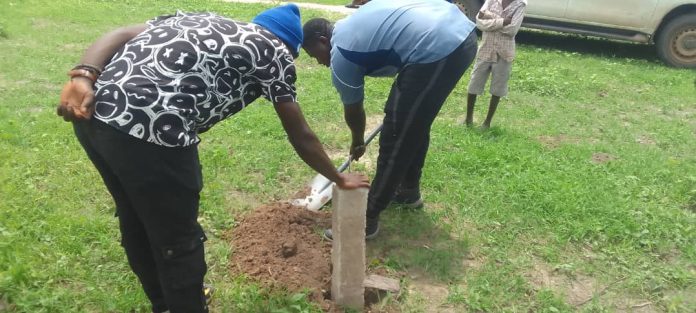By Hatab Nyang and Louise Jobe
The ongoing boundary demarcation exercise between Gunjur, Berending, and Madina Salam has come to an abrupt halt since Monday, 21st July 2025, following mounting technical and political concerns. Surveyors from the Department of Lands and Surveys say the stand-down is due to unresolved technical issues that must first be addressed with their supervising minister before operations can resume.
The two-week exercise, launched by the Department of Lands and Surveys, is part of a wider government effort to clearly define administrative boundaries across the country. In this particular case, the team of government surveyors were using GPS machines and maps obtained from the High Court and the Sheriff Division to retrace and mark coordinate points believed to represent official boundaries between the three communities.
However, the operation has triggered tension and protests—particularly from Kartong Village, which claims historical and customary ownership of some of the lands being demarcated. On Sunday, 20th July, a general meeting was convened at the Alkalo’s compound in Kartong, during which community elders and residents challenged the legitimacy of the government’s approach and questioned the transparency of the entire demarcation process.
Kartong’s Alkalo, Demba Jabang, told the meeting that the history of Berending’s founding supports Kartong’s ancestral claim to the disputed lands. Drawing on oral narratives passed down through generations, he traced the origins of Berending to a man named Buluwa Sanyang, who he said initially migrated from Cassamance to Kartong.
“Buluwa came to Kartong as a young man, worked in the oyster farms and later married and raised three sons—Sanna Berending, Ansu, and Bakary—all born in Kartong,” Alkalo Jabang recounted. He said that after a dispute over grazing rights in Gunjur, Buluwa was asked to relocate and was granted a tract of land by the elders of Kartong in the bushland between Gunjur and Kartong, which later became known as Berending. “At that time, there were no roads. People moved through the river or the beach,” he added, emphasizing the traditional authority of Kartong in that region.
The Kartong community’s resistance to the demarcation is rooted in fears of land loss, especially in the face of expanding estate development. At the same meeting, elder Bala Musa Manneh blamed estate agents and land speculators for stoking the crisis. “It’s because of these estate agents that land grabbing is escalating. Kartong, Gunjur, and Berending are interconnected. The government should step in and stop this now before it gets worse,” he warned.
Manneh stressed that the land in question forms the backbone of Kartong’s agricultural economy. “The land is our farms. If they forcibly take it from us, where are we going to farm? This is our livelihood. We are bordered by water on three sides and Gunjur on the fourth. This is the only land we have left.”
Imam Kawsu Manneh, another elder present at the meeting, echoed the frustrations of the community. “Let the government come and remove its boundary markers from our bush,” he said defiantly. “We will not sit by and watch them take our land.”
In the meantime, Kartong villagers have drafted a formal letter of protest addressed to the Ministry of Lands and Local Government. Copies of the letter have been shared with the Department of Lands and Surveys and other relevant authorities, articulating their objection to the demarcation and urging an immediate halt until consultations and reviews are held.
The Ministry of Lands and Local Government has not yet issued an official statement on the matter. However, officials within the Department of Lands and Surveys confirmed to Foroyaa that the technical delay is not due to community resistance but stems from internal clarifications that must be resolved at the ministerial level. Still, they did not provide a timeline for when the demarcation work would resume.
As tensions simmer and questions of ancestral land rights remain unresolved, the situation highlights the complex and often emotional nature of land disputes in The Gambia—where colonial-era boundaries, customary law, and modern development ambitions frequently collide.


















